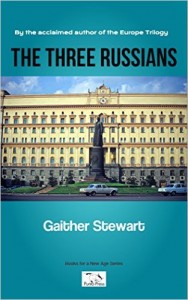
Reviewed by PAUL GARRETT
 The Three Russians. Punto Press, June 2016. By Gaither Stewart
The Three Russians. Punto Press, June 2016. By Gaither Stewart
“The Three Russians” by Gaither Stewart, TGP’s own Senior Editor and European Correspondent, has just been released and is available at Amazon and other outlets.
When confronted with geopolitical foes, the US attempts to dehumanise its opponents and classify them as threats. The demonising of Vladimir Putin, Russia and revival of the Cold War promoted mostly by the United States seems strangely at odds with the how hard the Russians are trying to collaborate on a number of fronts, Syria, Iran and North Korea.In Stewart’s book and his portrayal of the Russian intelligence agents he captures the essence of the point he makes in the preface, namely that there is little daylight between the objectives and conduct of the western and Russian intelligence operatives. Both are employed and dedicated to defence of their countries and their countries’ “national interest”, to borrow an over used American term. The Snowden files have underscored the duplicity and hypocrisy of American intelligence with its surveillance of both perceived enemies and allies. Not that this is exceptional. The world long ago abandoned Henry Stimson’s admonition, “gentlemen don’t read each others mail”. The intelligence craft is as integral a part of a government as any department or ministry and the people employed are as essential to a government as any other federal employee.
The current US foreign policy, that of the government and its docile media’s portrayal of Russia in general and Putin, in particular, borders on the irrational and hysterical. There seems no limit to what global ills or scandals the US can impute to Russia.
With the unwillingness of the US media to question US policies, it falls to the role of literature, in such works as The Three Russians, to bring to the public a better understanding of the countervailing forces from within and without. However the problem with understanding geopolitical issues rests as well with the general public that evinces neither interest in nor knowledge of international affairs. Worse yet, thought provoking books are not widely read and recent statistics regarding American literacy level do not bode well for serious literature. The study showed that only 13% of adults can read at a proficient level and 50% cannot read a book written at the 8th grade level.
To quote John Adams with respect to reading “The very Ground of our Liberties, is the freedom of Elections. Every Man has in Politicks as well as Religion, a Right to think and speak and Act for himself. No man either King or Subject, Clergyman or Layman has any Right to dictate to me the Person I shall choose for my Legislator and Ruler. I must judge for myself, but how can I judge, how can any Man judge, unless his Mind has been opened and enlarged by Reading. A Man who can read, will find in his Bible, in the common sermon Books that common People have by them and even in the Almanack and News Papers, Rules and observations, that will enlarge his Range of Thought, and enable him the better to judge who has and who has not that Integrity of Heart, and that Compass of Knowledge and Understanding, which form the Statesman.”
But no, video clips, tweets and canned stump speeches by candidates form the America public’s perception of both domestic and international issues. Reading a book is now regarded as a task, akin to book assignments in school, not enjoyment, not as a source of knowledge for enlargement of one’s mind.
Let us hope that authors such as Gaither Stewart will persevere and continue to provide us readers with the means to enlarge our minds.
Featured Graphic: “Industrial Spies” by Lionel Martinez, Flikr

